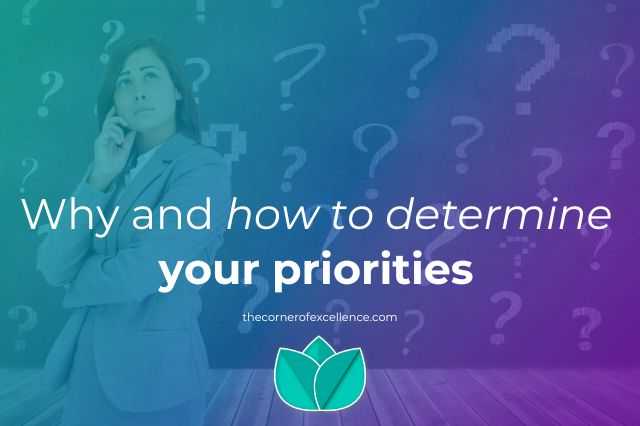What is really important to you? A lot is being said about the importance of prioritising. However, sometimes it can feel hard to figure out what is important, or manage to focus on the priorities. Let us see in this post, why and how to determine your priorities in the first place.
Types of priorities
When we hear about priorities it mainly tends to be work-related. But priorities are everything important in your life. What is more, if you only focus on work priorities you will probably struggle with finding a good work-life balance. What is important to you on a personal level will probably come short.
So, when you think about your priorities on a holistic level, some things you considered work priorities might end up in the category of important projects instead of general priorities.
Company priorities
If we think of a company, its priorities are shaped by its mission, values as well as the interests of shareholders and stakeholders. The main priority is obviously to make profit or grow the profit. But mission and values define how the company intends to do that, thus adding other priorities to the list.
An example could be being the leader of their segment in product or service quality. In this case RDi (research, development & innovation) will probably be a priority in order to continue satisfying their clients and staying ahead of their competitors.
If the company wants to lead in price, activities related to the search for cost-saving opportunities in production, packaging, delivery etc. will be more important.
Other priorities could be making a positive impact on the community (stakeholders) or environment for example.
With the company priorities in mind, the management can set goals to achieve.
Work priorities
The company priorities and goals then define our work priorities. Our work priorities should aim at creating the most value possible in our position. They should be aligned with the company priorities and help the company reach its goals.
Personal priorities
Your personal priorities are what is most important to you in your life. This can be your family, your health and well-being, your happiness, your personal development, or your career for example. This means your personal priorities can overlap with work priorities to some extent. But there are other priorities where work rather seems to interfere.

Why knowing your priorities is important
But why is it important to establish your priorities? Because, on one hand, this is the way to gain perspective. When you feel overwhelmed by multiple tasks, obligations, errands, projects and so on, remembering your priorities is very helpful. This allows you to keep an overview of what is important and what not.
On the other hand, this is the only way to make sure you dedicate your time and efforts to what matters. It goes without saying that it is hard to spend your time productively if you do not have clarity about the priorities, i.e. what is important.
The thing is that sometimes it can seem hard to know what is important, especially when you feel too busy to even take a moment to think. There seem to be so many important things going on and so little time to tackle them.
Prioritising means focussing your efforts on the right, i.e. the important things. It also means doing so at the right time keeping in mind the time available. It is about deciding what to do, what not or what to postpone, taking into account that time is limited.
How you can determine your priorities
We could say that the priorities are the important pillars that shape your life. Taking care of your priorities helps you work towards how you want your life to look like, how you want to be and act.
Core values as indicators of your priorities
In order to clarify what really is most important to you, thinking about your values is helpful. Core values shape how we behave and act, what we like and dislike, as well as our expectations. If you, for example, hate that people lie to you, honesty is probably a core value for you. If you like learning new things, curiosity and knowledge could be core values.
But how can you figure out those core values? A way to look at it is to think about character strengths that you value. Which characteristics are important to you, that you like in others? Also consider the contrary. Which character flaws do you dislike?
After listing all those values, I recommend you reduce the list to 5 core values. If everything is important nothing is a priority.
Aspirations as signposts for your priorities
The next step is to consider your aspirations. How do you see yourself and want your life to be in the future? Your ambitions and how you imagine your life are important when determining your priorities. This helps you decide what you should focus your efforts on.

Take time to determine your priorities
Figuring out your core values and considering your aspirations cannot be done in 5 minutes. Determining your real priorities, taking into account the information gathered also requires some time and effort.
Misalignment of priorities and actions
Knowing your priorities unfortunately does not always mean that you focus your efforts on the right things. Your personal priorities and what you do for them can be misaligned.
Think about people claiming their family is what is most important to them. But their way of showing it is working so much to allow them a comfortable lifestyle that they hardly spend any time with them. This happens when your definition of well-being is money affluence rather than time affluence.
Another example is claiming to value health but being unable to get rid of bad habits or incorporate more good habits into your life.
I invite you to reflect upon whether this could be the case with any of your priorities. The signs for a misalignment are usually feelings of not doing enough, being overwhelmed or dissatisfied.
Priorities evolve
Last but not least keep in mind that priorities are not static. As you and your life evolve, your priorities can and will, too. When you are younger, exploring the world or developing your career might be most important to you. Once you form a family, this most probably becomes one of your top priorities.
That is why you should check your priorities from time to time. On one hand consider whether your goals and actions are still aligned with your priorities. On the other hand reflect whether some of your priorities might have changed.
Do you know your priorities?
After reading this post, will you take time to determine your priorities? If you think you already know your priorities, are your actions aligned with them? If not, in what way and why?

Sharing is caring!




